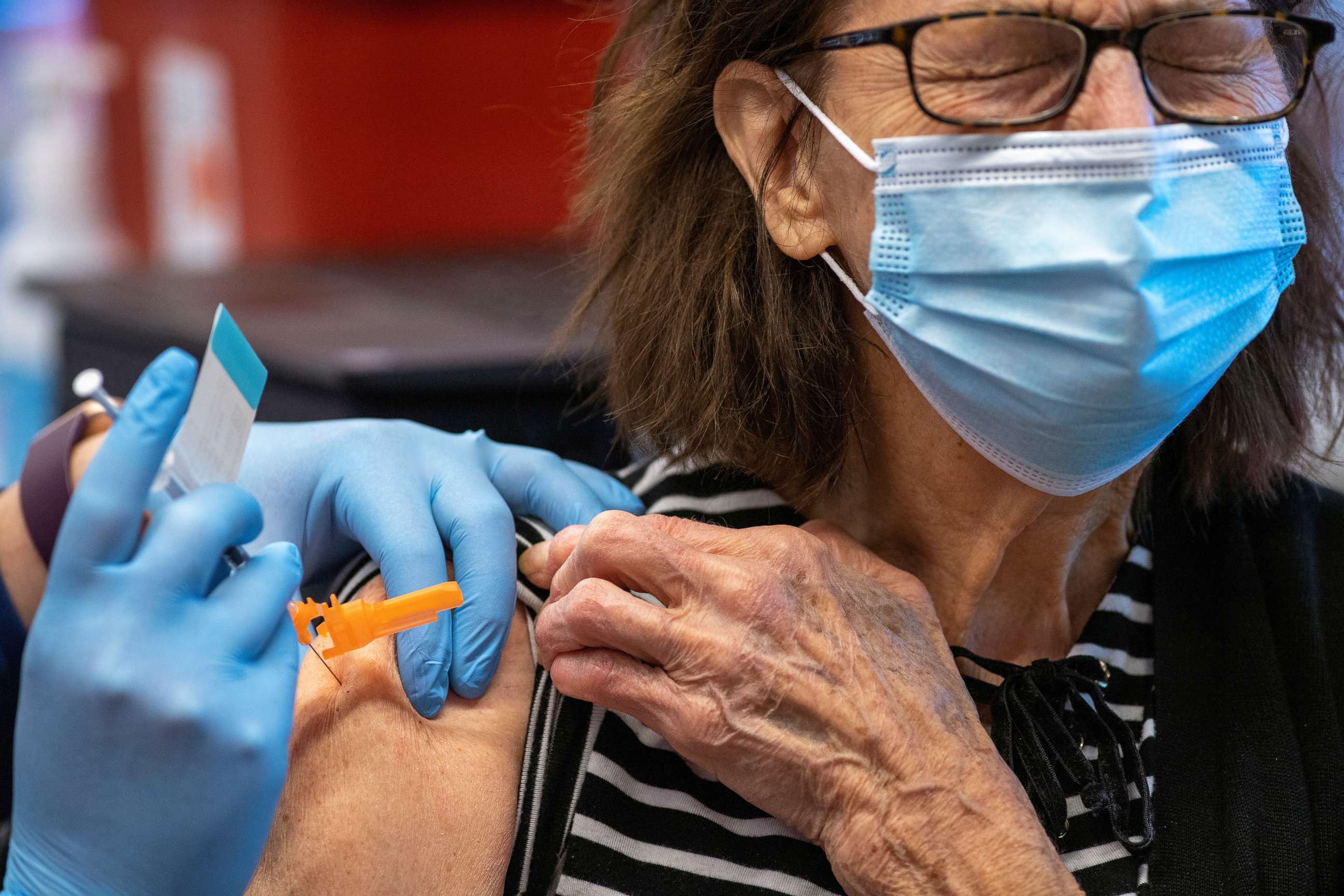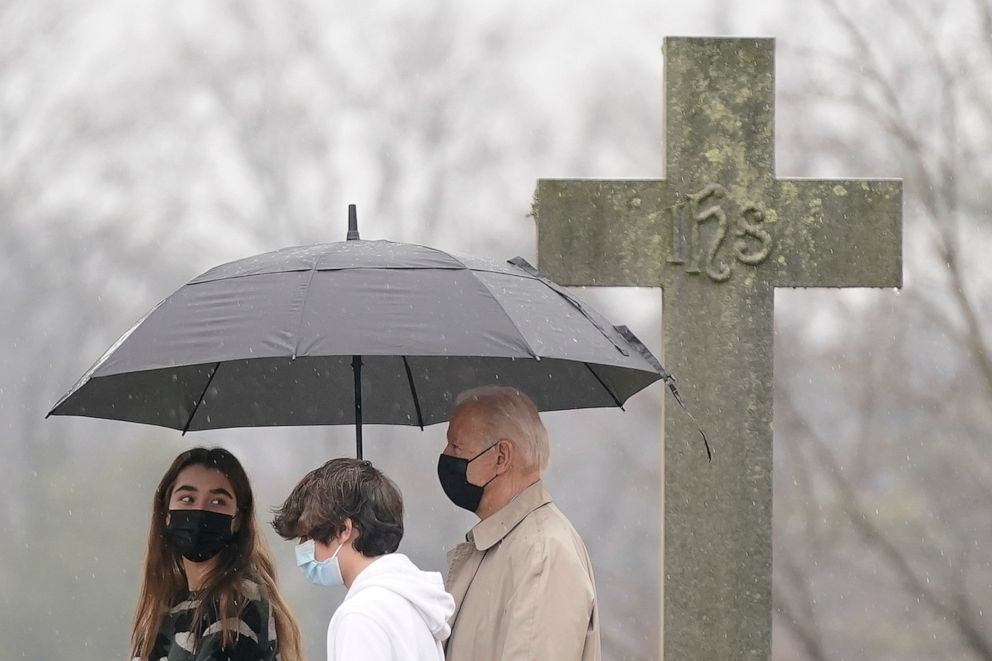Johnson & Johnson vaccine rekindles religious dilemma over morality of using fetal tissue
The Vatican previously said the Moderna and Pfizer vaccines were OK to use.
With Johnson & Johnson vaccines on their way across the country, a longstanding dilemma for religious conservatives is being revived: much of the research for coronavirus inoculations relies on the use of material derived from human fetal tissue -- something they have spent years fighting against.
Many next-generation vaccines -- including those from Pfizer, Moderna and Johnson & Johnson -- use specialized cells originally derived from aborted fetal tissue. Though not ingredients in the shots themselves, they're used in testing or making vaccines.
While Pfizer and Moderna used these cells during preliminary laboratory testing months ago, Johnson & Johnson's vaccine uses the cells as part of its existing manufacturing process -- raising especial "moral concerns," conservative leaders told ABC News.
"If one can choose among equally safe and effective COVID-19 vaccines, the vaccine with the least connection to abortion-derived cell lines should be chosen," Bishop Kevin C. Rhoades, chairman of the U.S. Conference of Catholic Bishops Committee on Doctrine, and Archbishop Joseph F. Naumann, chairman of the USCCB's Committee on Pro-Life Activities, said in a joint statement Tuesday night. "Therefore, if one has the ability to choose a vaccine, Pfizer or Moderna's vaccines should be chosen over Johnson & Johnson's."

Scientists agree abortion-derived "immortalized" cell lines have been vital in the most groundbreaking medical advances to date. The monoclonal antibody treatment taken by former President Donald Trump to treat COVID-19 was developed using cells derived from these cell lines through a research technique his administration sought to limit.
Even prior the first vaccine authorization for Pfizer in December, religious leaders and scientists were grappling with this complex issue, describing in interviews with ABC News at the time the conundrum posed by ethics, amid the urgency for safe and effective tools to fight the pandemic.
The issue has grown more salient with Johnson & Johnson's authorization and imminent availability.
While Moderna and Pfizer's vaccines are made using raw genetic material, vaccines like Johnson & Johnson's use an innocuous virus as a vehicle to deliver that genetic material into the body.
To make those vaccines en masse, fetal cell lines provide a factory to produce these viral delivery mechanisms. The mRNA vaccines don't need that, since they're produced synthetically. As for doing without these cell lines altogether, scientists have studied potential alternatives to the "immortalized" cell lines for similar application, but argue others aren't as effective.
"We are proud to bring our COVID-19 vaccine to the world and to contribute to ending this pandemic," a Johnson & Johnson spokesperson told ABC News, adding their vaccine development has been held to the "highest bioethical standards and guidelines," and they look forward to meeting what's such a critical need worldwide for COVID-19 vaccine.

But conservative groups maintain keen awareness of the nuance between these vaccines, and how "tainted" they are by these cell lines. The Charlotte Lozier Institute, the research arm of the anti-abortion rights nonprofit Susan B. Anthony List, has made a point of charting each of the vaccine candidates out.
Even months before the Johnson & Johnson vaccine was granted authorization, leaders in conservative and Christian spheres told ABC News they expected some might opt to choose the candidate distinguished by its farthest proximity to such cell lines.
While waiting for the Food and Drug Administration's decision to authorize the Johnson & Johnson vaccine Friday, the Archdiocese of New Orleans put out a statement saying that while the Pfizer & Moderna vaccines can be deemed "morally acceptable" by their remote connection, Johnson & Johnson's is "morally compromised."
Greg Schleppenbach, associate director of Secretariat of Pro-Life Activities with the USCCB, told ABC News in December the Johnson & Johnson and AstraZeneca vaccines bear a "much closer and more problematic" connection to abortion than the mRNA vaccines currently authorized.
Rev. Tadeusz Pacholczyk, director of education at the National Catholic Bioethics Center, said all of the currently available vaccines are "morally compromised" to some degree.
"We don't have a perfect choice, and it's not a totally linear decision," Pacholczyk said. "But that may change with time, and new data about relative efficacy of one vaccine compared to another -- or if new variants emerge."
Johnson & Johnson's vaccine was tested with new variants of COVID-19, and has shown to be effective against them; Pfizer and Moderna were tested prior to the emergence of these variants.
The renewed debate comes as the second Catholic president in American history sits in the Oval Office, and as public health leaders confront vaccine hesitancy.
President Joe Biden celebrated Johnson & Johnson's emergency authorization Saturday, calling it "exciting news for all Americans."

In late December, the Vatican wrote "when ethically irreproachable Covid-19 vaccines are not available ... it is morally acceptable to receive Covid-19 vaccines that have used cell lines from aborted fetuses in their research and production process."
"The moral duty to avoid such passive material cooperation is not obligatory if there is a grave danger, such as the otherwise uncontainable spread of a serious pathological agent," the Vatican said in a statement.
Pope Francis and Pope Emeritus Benedict XVI received the vaccine in January.
Controversy aside, scientists say that countless important medical discoveries have relied on fetal tissue, leading to significant work in research and treatment of diseases like AIDS and Zika.
Deepak Srivastava, president of the Gladstone Institutes and immediate past president of the International Society for Stem Cell Research, told ABC News that if these cell lines had never been made innovations would not have been possible.
"These next few months will be imperative to the race between vaccinations and variants, so the sooner people can take the vaccine, take it as soon as they can, the faster we can win," Srivastava said. "That's what's going to save lives."
The issue will only grow more complex as vaccine effectiveness and safety profiles continue to factor in further, especially with the potential for emerging variants.
"We recognize the pandemic is a changing terrain, and will require a number of judgments about these vaccines' characteristics and applicability," Pacholczyk said. "For the good judgment about protecting our health, that's just part of what we have to do."
ABC News' Anne Flaherty, Eric M. Strauss, Sony Salzman and Phoebe Natanson contributed to this report.




